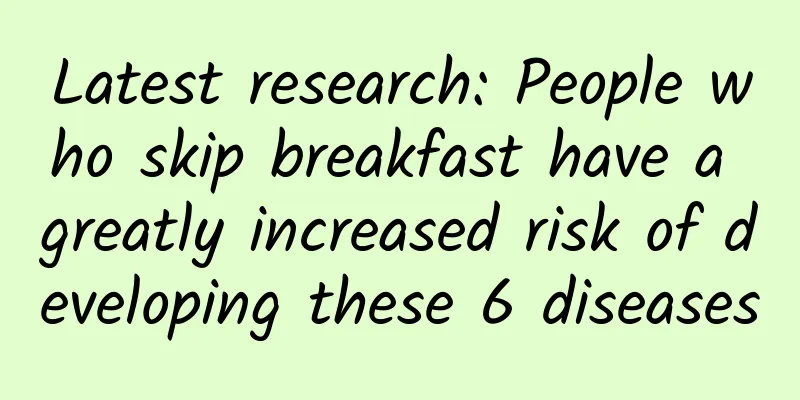Latest research: People who skip breakfast have a greatly increased risk of developing these 6 diseases

|
Researchers from the Run Run Shaw Hospital affiliated to Zhejiang University School of Medicine, the Zhejiang University-University of Edinburgh Joint College, and the Shanghai Institute of Materia Medica, Chinese Academy of Sciences, jointly published a paper in the academic journal Cell, showing that a lifestyle of skipping breakfast changes the way the small intestine absorbs nutrients, thereby increasing the risk of metabolic diseases. The researchers conducted group experiments on mice, with each group of mice receiving a different feeding regimen. One group of mice did not eat immediately after waking up, which was equivalent to skipping breakfast, and they remained fasting for a similar period of time as people who did not eat breakfast. By analyzing the absorption response of the mouse small intestine to nutrients in detail, the researchers found that long-term fasting can damage the intestinal barrier function. For mice that often skip breakfast, their small intestinal epithelial cells will excessively absorb lipids during subsequent eating, thereby increasing the risk of problems such as atherosclerosis. In the summary of this paper, the authors clearly pointed out that skipping breakfast may lead to excessive lipid absorption by epithelial cells, thereby exacerbating the development of metabolic diseases. Skipping breakfast carries many risks 1. Hypoglycemia: After a night's sleep, the body's blood sugar level is low. Breakfast can provide the body with glucose, which can bring blood sugar back to normal levels. If you skip breakfast, blood sugar cannot be replenished in time, and hypoglycemia may occur, with symptoms such as dizziness, fatigue, palpitations, and cold sweats. Long-term and repeated hypoglycemia may also affect brain function, leading to memory loss and inattention. 2. Slow metabolism: When you skip breakfast, your body will mistakenly think it is in a "starvation state" and thus slow down its metabolism to save energy. This may cause fat to accumulate more easily, which is not conducive to weight control in the long run. At the same time, a slowed metabolism will also weaken the functional activities of various organs and systems in the body. 3. Abnormal gallbladder function: Eating breakfast can stimulate the gallbladder to contract, promote bile discharge, and help digest fat. If you often skip breakfast, bile will accumulate in the gallbladder for a long time, which is easy to form gallstones. 4. Gastrointestinal problems: Gastric acid is continuously secreted even if there is no food in the stomach. Skipping breakfast will cause gastric acid to directly stimulate the gastric mucosa, which may cause gastritis, gastric ulcers and other stomach diseases in the long run. In addition, regular breakfast helps promote intestinal peristalsis. Skipping breakfast will slow down intestinal peristalsis and easily lead to intestinal problems such as constipation. 5. Decreased physical strength and endurance: Without breakfast to provide energy, the body's physical energy reserves are insufficient. Whether it is physical labor or work or study that requires long periods of energy, people who skip breakfast will feel more tired and their endurance will be significantly reduced. For example, when people are doing sports activities in the morning or have long meetings or courses, people who skip breakfast may find it difficult to concentrate on completing tasks. 6. Cognitive function is affected: Skipping breakfast will cause the brain to lack sufficient glucose and nutrients, resulting in slower brain reaction and slower thinking. People who skip breakfast may perform poorly in work scenarios that require quick thinking and problem solving or in learning situations such as exams. Breakfast Guide: How to Scientifically Match a Nutritious Breakfast 1. Time: Breakfast should be eaten between 7 and 9 in the morning . This period of time is when the gastrointestinal function of the human body is most active, and it is also the best time for the body to absorb nutrients. 2. Food selection: Breakfast should be light, easy to digest, and nutritionally balanced . You can choose porridge, soy milk, milk, eggs, bread, etc. Avoid overly greasy and spicy foods to avoid irritating the gastrointestinal tract and affecting digestion and absorption. 3. Food intake: The amount of food for breakfast should be moderate, not too full or too hungry . Being too full will increase the burden on the gastrointestinal tract, while being too hungry will affect the body's energy supply. 4. Eating habits: You should develop a habit of eating breakfast at regular times and in regular amounts. Do not change the time and amount of food at will. At the same time, you should avoid eating breakfast while walking or working to avoid affecting digestion and absorption. 5. Dietary combination: Pay attention to the combination of food for breakfast. For example, you can pair it with fruits, vegetables and other foods rich in vitamins and fiber to increase nutritional intake. |
<<: “Irradiated food” is related to radiation. Is it harmful to the human body if eaten?
>>: Scientists create world's thinnest noodles, smaller than the wavelength of light!
Recommend
My experience with the lightweight version of Find7
I just got find 7, let me say something. 1: Regard...
A creative solution for high conversion advertising!
When doing information flow promotion, the page c...
Ancient Alliance Douyin account raising skills editing techniques + material selection + fixed playback + blasting live broadcast room
Ancient Alliance Douyin account raising skills ed...
Ezhou SEO training: page template updates, 404 page usage and redirection issues are all Xiong Zhanghao page transformation comparison
When configuring the Xiong Zhang account, you fir...
Black hat seo search engine optimization Baidu cloud download
Black hat SEO technical training, a cool black hat...
Mysterious "architecture" on the African continent - the strange African ant nest
Strange African ant nest When I was working in Af...
Why does your app have no users? Because the IQ of ordinary people is "too low" to learn...
Bump is an amazing cross-platform data transfer a...
Meizu Note 2 hands-on: Details make a big difference
Meizu brought the Meizu Blue Note 2, which has al...
Can brown sugar water, spinach, and wolfberry replenish iron? These four foods are the real iron supplements...
Author: Xue Qingxin, registered dietitian Reviewe...
Be careful when reading long and informative articles! ASO optimization experience: Tips for APP keyword optimization
For your product, choosing the right keywords for...
When will Changchun City be able to lift the lockdown in 2022? When exactly will work and production resume? Attached the latest news
At present, the epidemic situation in Jilin Provi...
How to go from 0 fans to 7K+ seed users through Missionbao?
In mid-July, I did an online micro-class sharing ...
@2022 College Entrance Examination, please accept this college entrance examination tips
The 2022 National College Entrance Examination is...
Dongfeng Fengguang 580 Smart Link model debuts at Guangzhou Auto Show: Would you buy a talking domestic SUV?
Judging from the domestic SUV sales ranking for O...
Ideas for building a Baidu promotion account, how to build a Baidu search engine account?
Many friends don’t know where to start when they ...









